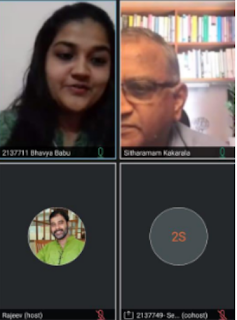This online webinar titled "The invisible virus and the visible injustice" was conducted by the Department of Sociology and Social Work Students Association In collaboration with Socius, the Applied Sociology Students’ Collective. Dr Vatsala Aithal, is a renowned economist and sociologist, working as faculty of Applied Social Sciences in Germany. Dr Aithal has had a good rapport with CHRIST (Deemed to be University) for more than five years, which made the talk even more engaging and interesting.
Dr Aithal began her talk by emphasizing how the Covid-19 virus is invisible whereas poverty is so much visible in our society. Her background as a global scholar is significant to her work with refugees, as she adopts a socio-economic perspective in her talk.
Dr Aithal talked about the contrast between societal and development requirements of the virus and how the last two years have been very interesting with respect to Covid-19. As the Covid-19 virus expands in contemporary society, other social problems like poverty and unemployment are on the rise.
Poverty is visible in all domains be it economic, sociological, political or ecological. The growth of Covid-19 in our economic and social domain has reached a tipping point, which impacts the corporate sector the most, which is now being acknowledged by the government. According to her, the onset of this global virus has led to equalization of the social and economic equilibrium, worldwide. However, the provision of supplies by government hospitals like ventilators and oxygen did not involve equal distribution
Further, there were discussions ranging from Global North and South and their high standards of living. We also discussed the international division of labour, production, trades and tariffs. Dr Aithal then pointed out how most people in today's society is committed to sustainable development but still use plastic and contribute to the overall pollution in society. Concluding remarks were given by Dr Aithal who answered a few questions raised by the students about consumerism and health factors amid the Covid 19 situation.
The Vote of Thanks was given by Ishani Choudhary who thanked Dr Vatsala Aithal, Dr Victor Paul, HOD Sociology and Social work and faculty members.

.png)





